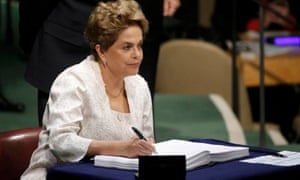by PERRY ANDERSON
 Brazilian president Dilma Rousseff signs the Paris Agreement on climate change at the UN general assembly before telling reporters her impeachment is a modern day coup PHOTO/Carlo Allegri/Reuters/The Guardian
Brazilian president Dilma Rousseff signs the Paris Agreement on climate change at the UN general assembly before telling reporters her impeachment is a modern day coup PHOTO/Carlo Allegri/Reuters/The Guardian
The BRIC countries are in trouble. For a season the dynamos of international growth while the West was mired in the worst financial crisis and recession since the Depression, they are now the leading source of anxiety in the headquarters of the IMF and the World Bank. China, above all, because of its weight in the global economy: slowing output and a himalaya of debt. Russia: under siege, oil prices falling and sanctions biting. India: holding up best, but unsettling statistical revisions. South Africa: in free fall. Political tensions are rising in each: Xi and Putin battening down unrest with force, Modi thrashed at the polls, Zuma disgraced within his own party. Nowhere, however, have economic and political crises fused so explosively as in Brazil, whose streets have in the past year seen more protesters than the rest of the world combined.
Picked by Lula to succeed him, Dilma Rousseff, the former guerrilla who had become his chief of staff, won the presidency in 2010 with a majority nearly as sweeping as his own. Four years later, she was re-elected, this time with a much smaller margin of victory, a 3 per cent lead over her opponent, Aécio Neves, the governor of Minas Gerais, in a result marked by greater regional polarisation than ever before, the industrialised south and south-east swinging heavily against her, and the north-east delivering an even larger landslide for her – 72 per cent – than in 2010. But overall it was a clear-cut win, comparable in size to that of Mitterrand over Giscard, and a good deal larger, not to mention cleaner, than that of Kennedy over Nixon. In January 2015 Dilma – from this point we’ll drop the surname, as Brazilians do – began her second presidency.
Within three months, huge demonstrations packed the streets of the country’s major cities, at least two million strong, demanding her ouster. In Congress, Neves’s Brazilian Social Democracy Party (PSDB) and its allies, emboldened by polls showing Dilma’s popularity had fallen to single figures, moved to impeach her. On May Day, she was unable even to give the traditional televised address to the nation: when her speech on International Women’s Day in March had been broadcast people banged saucepans and blew car horns, a form of protest that became known as panelaço. Overnight, the Workers’ Party (PT), which had long enjoyed by far the highest level of approval in Brazil, became the most unpopular party in the country. In private, Lula lamented: ‘We won the election. The following day we lost it.’ Many militants wondered if the party would survive at all.
London Review of Books for more
